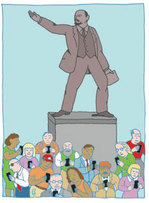I've long been advoacating the use of social media on the internet for the benefits of CISV, especially here at FTB.. However, I've also had my doubts, of how much use it could really be. Malcom Gladwell's must-read piece in The New Yorker compares the aspirations of social media like Facebook and Twitter to the civils rights movements and claims that "lose Networks" are good for some things but not for change. Instead, Malcolm insists, hierachical systems have more power to pursue the drive for change.
 Looking at CISV, it's amazing to see, how many people have signed up for the friends website, the various Facebook groups (and CISV & Me), and participate in the JBpedia project. But how much have we really gained from those networks? Most of JBPedia's most updated content is user's pages, making it rather a social network than a collection of information. Chapters are still struggling to find staff - which requires of the personal-conncetion Gladwell describes. Fundraising hasn't really improved, even though we could contact 1000s of (ex-)CISVers with the click of a mouse. Instead, most of our success stories are driven by our "classical" (or "hierachical") struture from the IEC and IO down to the chapter level.
Looking at CISV, it's amazing to see, how many people have signed up for the friends website, the various Facebook groups (and CISV & Me), and participate in the JBpedia project. But how much have we really gained from those networks? Most of JBPedia's most updated content is user's pages, making it rather a social network than a collection of information. Chapters are still struggling to find staff - which requires of the personal-conncetion Gladwell describes. Fundraising hasn't really improved, even though we could contact 1000s of (ex-)CISVers with the click of a mouse. Instead, most of our success stories are driven by our "classical" (or "hierachical") struture from the IEC and IO down to the chapter level.
Time will tell the truth, and the reality is, I believe, that this rather new form of networking and communication will need some time to settle in: We're still in the process of trying to find out, how best to use Facebook or Twitter or Wikis. Some day in the future, we will in fact be able to truly reap benefits from social media.
Also, on The Economist's website you'll find a more optimistic look on the issue - so, obviously, the issue is far from settled.
 Looking at CISV, it's amazing to see, how many people have signed up for the friends website, the various Facebook groups (and CISV & Me), and participate in the JBpedia project. But how much have we really gained from those networks? Most of JBPedia's most updated content is user's pages, making it rather a social network than a collection of information. Chapters are still struggling to find staff - which requires of the personal-conncetion Gladwell describes. Fundraising hasn't really improved, even though we could contact 1000s of (ex-)CISVers with the click of a mouse. Instead, most of our success stories are driven by our "classical" (or "hierachical") struture from the IEC and IO down to the chapter level.
Looking at CISV, it's amazing to see, how many people have signed up for the friends website, the various Facebook groups (and CISV & Me), and participate in the JBpedia project. But how much have we really gained from those networks? Most of JBPedia's most updated content is user's pages, making it rather a social network than a collection of information. Chapters are still struggling to find staff - which requires of the personal-conncetion Gladwell describes. Fundraising hasn't really improved, even though we could contact 1000s of (ex-)CISVers with the click of a mouse. Instead, most of our success stories are driven by our "classical" (or "hierachical") struture from the IEC and IO down to the chapter level. Time will tell the truth, and the reality is, I believe, that this rather new form of networking and communication will need some time to settle in: We're still in the process of trying to find out, how best to use Facebook or Twitter or Wikis. Some day in the future, we will in fact be able to truly reap benefits from social media.
Also, on The Economist's website you'll find a more optimistic look on the issue - so, obviously, the issue is far from settled.

Leave a comment